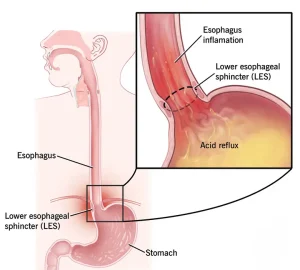Overview
Diagnosis
To determine whether your heartburn is a symptom of gastroesophageal reflux disease (GERD), a healthcare professional may recommend several diagnostic tests to evaluate the structure and function of your esophagus and stomach. These tests help identify the severity of acid reflux and rule out other conditions that may cause similar symptoms.
Common diagnostic tests for GERD include:
-
X-ray: Helps visualize the shape and condition of the esophagus and stomach to detect structural abnormalities.
-
Endoscopy: Uses a thin, flexible tube with a small camera to examine the esophagus and stomach. This allows doctors to check for inflammation, ulcers, or other irregularities. A small tissue sample (biopsy) may also be taken for laboratory analysis.
-
Ambulatory acid probe test: Measures how often and for how long stomach acid enters the esophagus. A small acid monitor is placed inside the esophagus and connected to a portable computer worn around the waist or shoulder.
-
Esophageal motility testing: Evaluates the muscle contractions and pressure in the esophagus to see how well food and liquids move toward the stomach.
These tests help confirm a GERD diagnosis and guide appropriate treatment.
Treatment
Treatment for heartburn and GERD focuses on relieving symptoms, healing the esophagus, and preventing future episodes. In many cases, over-the-counter medications can help manage mild symptoms.
Common treatment options include:
-
Antacids: Neutralize stomach acid and provide quick relief from heartburn. However, they do not heal an esophagus damaged by acid reflux.
-
H2 blockers: Reduce the amount of acid produced by the stomach. They take longer to work than antacids but provide longer-lasting relief. Examples include cimetidine (Tagamet HB) and famotidine (Pepcid AC).
-
Proton pump inhibitors (PPIs): Significantly reduce stomach acid production and promote healing of the esophagus. Examples include esomeprazole (Nexium 24HR), lansoprazole (Prevacid 24HR), and omeprazole (Prilosec OTC).
If over-the-counter treatments do not provide sufficient relief or symptoms occur frequently, it is important to consult a healthcare professional. You may need prescription-strength medications or additional diagnostic testing to manage GERD effectively and prevent complications.
Advertisement

